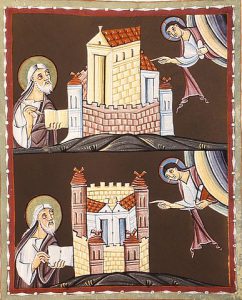
Due to the blood of the Lamb, the people of God are already his holy ones and his priests prior to their entry into the New Jerusalem (Rev. 5:10; 13:7; 17:6). Yet their current holiness is incomplete, as the seven letters to the seven churches show (Rev. 2-3). We will look briefly at the Sardis letter, since it appears to relate to the priestly nature of God’s people in the present time. In contrast to the sinners at Sardis, Revelation 3:4 refers to the few people at Sardis “who have not defiled their garments.” These are the faithful, obedient servants of Jesus at Sardis. When Jesus sees them, he sees spiritual garments that are pure. They will be rewarded when Jesus comes back, for “they are worthy” (3:4). Their reward will be to “walk with me in white garments” (3:4). This promise of being with Christ and having white garments anticipates Revelation 7:14-15, where all of the faithful servants of the Lamb will one day dwell with him and serve him as his priests. Like the robes of the Old Testament priests, they will have robes cleansed with the blood of a sacrifice. Their robes will one day be perfectly white and clean, because they have received the perfect, eternal benefits of the blood of the perfect sacrifice, the Lamb of God. Therefore, the faithful ones at Sardis will one day join all of the Lamb’s faithful conquerors in perfectly white robes that have been washed in the Lamb’s blood (7:14).
The Sardis letter provides an important clue regarding the nature of the priestly service of the people of God in the present time. Those who “have not defiled their garments” are maintaining their purity by their perseverance in obedience to God’s commandments (3:4). Due to their obedience, they are maintaining a purity of life that is worthy of reward in the future. Their service to God in the present time takes the form of obedience to God’s commandments. This is true for the seven letters of Revelation 2-3 as a whole. Jesus’ words to the churches confirm that he is calling the churches to be obedient to God’s commandments (Rev. 2:4-5, 2:20). Similarly, Revelation 14:12 makes an important ethical statement that characterizes the ethics of the book of Revelation. It shows what God desires from his priests, his servants, in the present time. Revelation 14:12 says, “Here is the perseverance of the saints, who are keeping the commandments of God and their faith in Jesus.” Notice that faith and obedience belong together. God’s commandments show his people how to love and serve him. Those who truly have faith in Jesus demonstrate that they are the people (and priests) of God through their obedience (see also 1 John 3:23-24; 5:1-5).
Sources:
These paragraphs represent an edited excerpt from an essay that I wrote and published:
Paul Hoskins, “Priesthood in the Book of Revelation.” Southern Baptist Journal of Theology 22 (2018): 101-17.
For further information about the verses referenced above, see Paul Hoskins, The Book of Revelation: A Theological and Exegetical Commentary.
